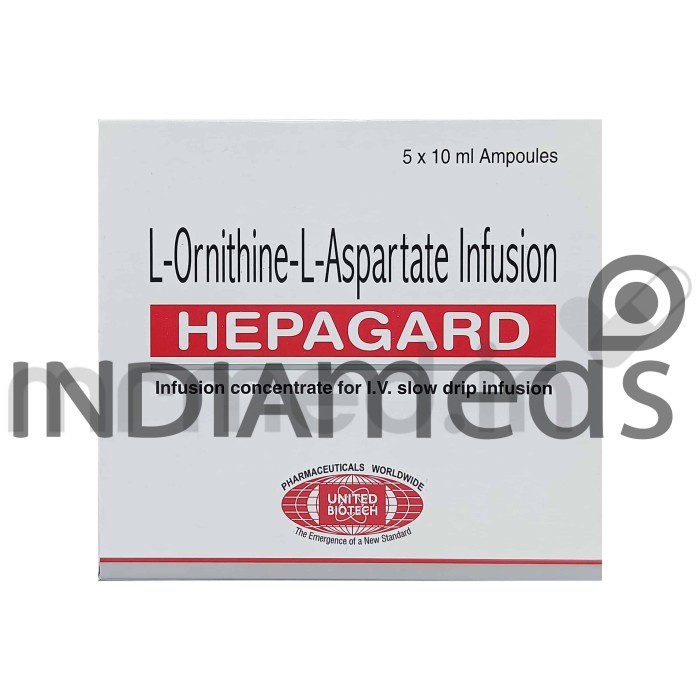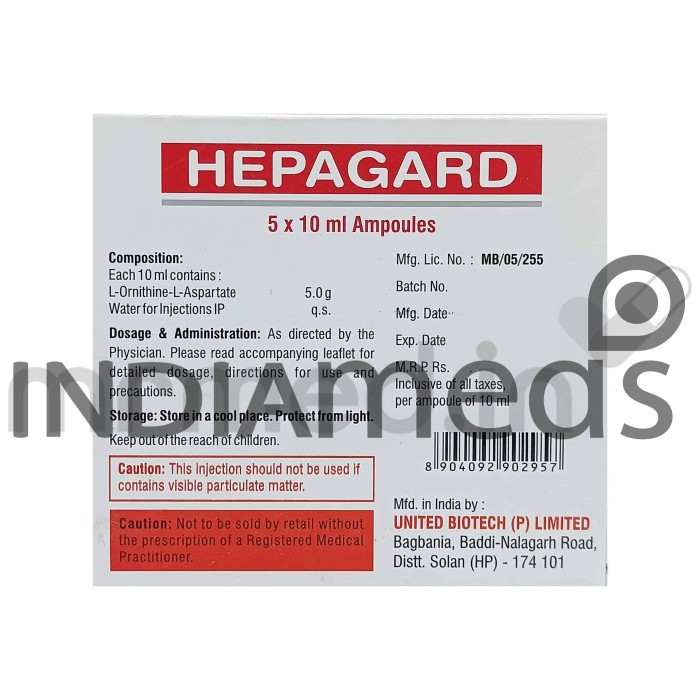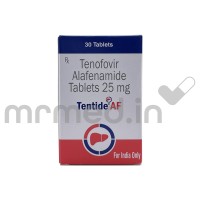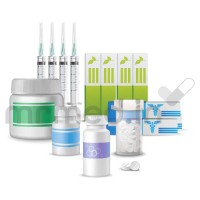Hepagard injection is used as a is a hepatoprotective supplement that contains Vitamin, L-Aspartate, L-Ornithine, niacinamide, L-glutathione, and Silymarins. It is used to facilitate detoxification and cell growth. This medicine contains antioxidants and minerals that counteract free radical damage and enhance bodily functions. It enhances liver activity, aids in detoxification, and promotes mineral absorption. It prevents irregular cell growth and safeguards against DNA damage by free radicals, while bolstering the immune system and alleviating oxidative stress. Additionally, its anti-inflammatory attributes offer further benefits. It improves the quality of life and nutritional status in patients with liver disorders such as hepatic encephalopathy (an altered level of consciousness due to liver failure), chronic hepatitis (inflammation of the liver), liver cirrhosis (a condition in which scar tissue replaces healthy liver tissue) and alcoholic liver disease (damage of liver caused due to too much alcohol consumption).
Do not consume if you are allergic to Vitamin, L-Aspartate, L-Ornithine, Silymarin, or its other components. Avoid consuming this drug and contact your doctor immediately if you develop a rash or skin symptoms. If you are pregnant, think you may be pregnant, or planning for the pregnancy, it is generally recommended to consult your doctor for more advice before taking this capsule. Contact your physician for more information if you are breastfeeding or planning to breastfeed. Consult your doctor before taking any new supplement, including Hepagard injection, especially if you have a compromised immune system. Your physician can provide personalized advice based on your medical history and help determine if the particular combination of probiotic strains suits you.
Therapeutic Effects of Hepagard Injection
Pregnancy
It is unknown whether consuming Hepagard injection during pregnancy is safe. Inform your physician if you are pregnant and planning for pregnancy during the treatment.
Breast Feeding
It is unknown whether consuming Hepagard injection while breastfeeding is safe. Inform your physician if you are a nursing mother.
Lungs
Limited information on using Hepagard injection in patients with Lung problems is available. Inform your physician if you have any lung diseases before initiating the treatment.
Liver
Limited information on using Hepagard injection in patients with liver problems is available. Inform your physician if you have any liver diseases before initiating the treatment.
Alcohol
Limited information is available on the safety of consuming alcohol with Hepagard injection. Contact your doctor for more information.
Driving
Hepagard injection does not affect your ability to drive and operate heavy machinery. Inform your physician if you face any symptoms that alter your concentration.
Common
- Nausea
- Headache
- Weakness
Contact your doctor for more information.
Hepagard injection works by nourishing beneficial gut bacteria, promoting their growth and activity. They are non-digestible fibers fermented by these microbes, producing compounds that enhance gut health, digestion, and immunity.
The common side effects of Hepagard injection are nausea, headache, and weakness. If you experience any side effects it is advised to contact your doctor immediately.
Hepagard injection is commonly prescribed to promote immune system health, replenish healthy bacteria, and support healthy digestive balance.
It is recommended to store Hepagard injection below 25℃. Keep the capsules in a cool, dry place, away from sunlight and moisture. Some medications may require refrigeration. It is important to read and follow the storage instructions to maintain the medication's stability and efficacy.
Take the Hepagard injection as advised by your physician. Do not crush, chew, or open the medicine. Your physician will decide the correct dosage and duration based on age, body weight, and disease condition. Only stop taking the capsule if your doctor advises you to stop.
| Molecule name: L-Aspartate + L-Ornithine | Therapeutic class: Dietary Supplements |
Pharmacological class: Supplement
| Indications: 1. Enhances digestion 2. Strengthens the immune system 3. Lowers the risk of chronic illnesses |









